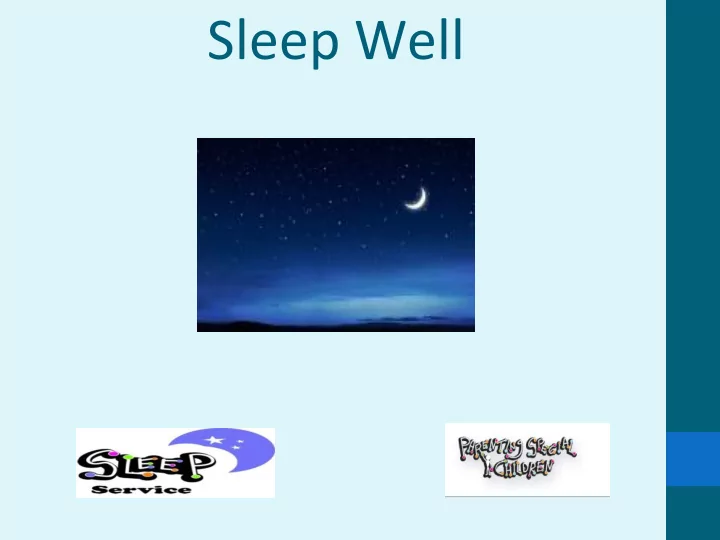

Sleep Well
Sleep Practitioners Trained at Southampton NHS Sleep Clinic 1. Helen Cattermole, RN 2. Helen Tracey, SW 3. Catherine Greaves, RN RM 4. Ruth Pearse, BEd
What are you expecting from this session ?
Control of our sleep/wake cycle • Body Clock • Hypothalamus in the brain • Sleep hormones
Which hormone is the “gatekeeper of sleep”?
Melatonin Light - natural or artificial Dim light/dark especially blue light Retina (eye) Retina (eye ) Brain Brain Stimulates melatonin Inhibit/stops melatonin Feel Sleepy Feel Awake Stay asleep Stay awake
Questions
Sleep Cues - support the body clock to run at 24 hours rather than 25 hours • Light/Dark – the most important (melatonin) • Sound (usually lack of or a sound only associated with sleep) • Regular timing of meals • Temperature • Social Cues/Behaviours eg bedtime routine • Feeling calm & relaxed
What sleep difficulties are you dealing with?
Common Sleep Difficulties • Settling difficulties. • Night waking • Early morning waking What strategies are likely to work – research and experience of Sleep Practitioners – • Bedtime Routine • Gradual Retreat • Delayed bedtime
What you do to help settle your child at bedtime, be prepared to do at 2:00, 3:00 or 4:00am!
Bedtime routine 1. Home from school 2. Snack 3. Outside play/physical activity 4. Homework 5. Mealtime 6. Homework/Playtime 7. Screens off at least one hour before bedtime 8. Quiet play (fine motor) and snack if needed. Time to talk – worries/anxieties 9. Bath & pyjamas (1/2 hr before bedtime) 10. Get into bed (cool, dark, quiet room) 11. Story/ self reading. 12. Leave child to settle to sleep
Like to find out more ? For parents/carers of children/young people with special needs • Sleep Workshops for parent/carers • Sleep Clinic • Specialist parenting courses • Suggested book
Contact details 0118 986 3532 www.parentingspecialchildren.co.uk sleep@parentingspecialchildren.co.uk
Recommend
More recommend